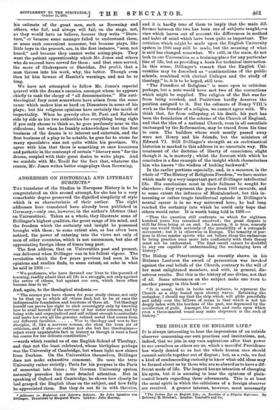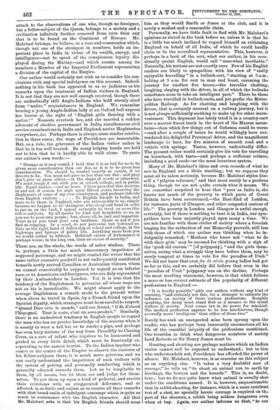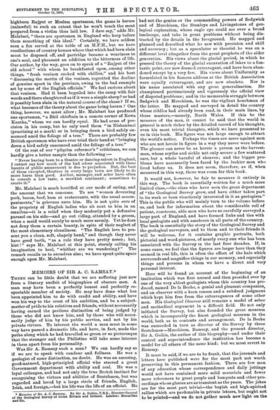THE INDIAN EYE ON ENGLISH LIFE.*
IT is always interesting to hear the impressions of an outside observer concerning our own practices and institutions, not, indeed, that we join in any vain aspirations after that power to see ourselves as others see us, which a merciful Providence has wisely denied to us lest the whole human race should commit suicide together out of disgust ; but, as a rule, we feel a kind of condescending curiosity to know what odd ideas may be formed about us by those who are so absurd as to have a dif- ferent mode of life. The leopard has no intention of changing his spots, but it is amusing to hear the opinions of plain- coated beasts regarding those adornments. This is at least the usual spirit in which the criticisms of a foreign observer are received. A greater interest, however, must necessarily • The Indian Eye on English Life; or, Rambles of a Pilgrim Reformer. By Eebramji M. Kalahari. Loudon: Constable and Co.
attach to the observations of one who, though no foreigner, but a fellow-subject of the Queen, belongs to a society and a civilisation infinitely further removed from ours than any that is to be found on the Continent of Europe. Mr.
Malabari belongs, we believe, to a race and communion which, though not one of the strongest in numbers, holds an im- portant place in India in virtue of its wealth, energy, and intelligence—not to speak of the conspicuous loyalty dis- played during the Mutiny—and which counts among its numbers a Member of the Imperial'Parliament representing a division of the capital of the Empire.
Our author would certainly not wish us to consider his con- clusions with any special indulgence on this account. Indeed, nothing in his book has appeared to us so judicious as his remarks upon the treatment of Indian visitors in England. It is not that they are not well enough received, though there are undoubtedly still Anglo-Indians who hold sternly aloof from " native " acquaintances in England. We remember hearing a young Anglo-Indian lady at an Oxford ball express her horror at the sight of "English girls dancing with a native !" Nemesis overtook her, and she married a red-hot advocate of elective government in India; simultaneous civil service examinations in India and England, native Magistrates everywhere, &c. Perhaps there is always some similar retribu- tion in these cases ; the ways of Providence are inscrutable. But, as a rule, the grievance of the Indian visitor rather is that he is too well treated. So many helping hands are held out to him that he is hardly able to walk alone. To quote our author's own words :-
"Strange as it may sound, I hold that it is as bad for us to be given more consideration than our due, as it is to be given less consideration. We should be treated exactly as equals, if we deserve to be. You must not give us less than our due; and pray don't give us more either,—in the shape of words or otherwise. We must rough it out with you at school, college, and in public life. Equal justice,—and no snore. I have preached this doctrine in and out of season for nigh upon fifteen years, incurring the displeasure of some of my own countrymen, and perhaps ridicule
from English visitors To English friends in India, and more so to those in England, who are extra-polite to us, simply because we happen to be strangers, who stoop and bend in order to pat us on the back, I appeal earnestly to treat us more like fellcw-subjects. By all means be kind and hospitable to us, as you are to your own people ; but, above all, be just and impartial. Treat us as you treat your own brethren. Spare us not if you find us tripping. In a word, do not patronise but befriend us. Give us the right hand of fellowship at school and college, in the highways and byways of public life. Anything more from you we would rather be without. Habitual excess of forbearance is perhaps worse, in the long run, than an excess of severity."
These are, on the whole, the words of sober wisdom. There is, perhaps, a little too much unnecessary impatience of
supposed patronage, and we might remind the writer that the
same rather excessive goodwill is not unfrequently manifested
towards newly arrived Canadian or Australian visitors, whom -we cannot conceivably be supposed to regard as an inferior race, or to Americans and foreigners, who are duly represented by their Ambassadors in London. Yet it is true that the tendency of the Englishman to patronise all whose ways are not as his is ineradicable. We might almost apply to the average Englishman a remark made to the present writer when about to travel in Spain, by a French friend upon the Spanish dignity, which strangers must be so careful to respect. "Quand Dieu crea le monde," said our friend, " il fit d'abord l'Espagnol. Tont le rests, c'est un sous-produit." Similarly, there is an undoubted tendency in English people to regard the man'who has no precise knowledge of the seasons when it
is seemly to wear a tall hat or to smoke a pipe, and perhaps has even hazy notions of the way from Piccadilly to Charing Cross, as a sort of infant who requires to be humoured and guided in every little detail, which must be frantically ex- asperating to the merest tourist. To the Indian inquirer who comes to the centre of the Empire to observe the customs of his fellow-subjects there, it is much more grievous, and we can easily understand the impatience of such visitors with the system of petting and personally conducting which is
generally adopted towards them. Let us be hospitable to them, by all means, but let them see and judge for them-
selves. To put them up upon a kind of pedestal, and receive their criticisms with an exaggerated deference, real or affected, is as futile and unjust as to receive all their remarks with that broad smile of indulgent contempt which is quite as much in consonance with the English character. All that Mr. Malabari asks is that his English friends should treat
him as they would Smith or Jones at the club, and it is surely a modest and a reasonable claim.
Personally, we have little fault to find with Mr. Malabari's opinions as stated in the book before us, unless it is that he is a little too much inclined to regard himself as criticising England on behalf of all India, of which he could hardly claim to be the accredited representative. This, however, is perhaps in a book of the sort, what our author, in his occa- sionally quaint English, would call "somewhat inevitable." Naturally, his notions are not exactly ours. Few of his English readers are likely to sympathise with his view of "really enjoyable travelling " in a bullock-cart, " starting at 3 a.m., halting at 9 a.m. for rest to man and beast, resuming the journey for another five hours,—the traveller chatting, laughing, singing with the driver, in all of which the bullocks sometimes seem to take an intelligent part." There be those who have travelled in bullock-carts, and yet prefer the Metro- politan Railway. As for chatting and laughing with the driver, that is certainly unusual on a railway journey, but it is not always sufficiently soothing to make up for other incon- veniences. This deponent has lately tried it in a country-cart over a narrow forest track in the heart of the Maures moun- tains—than which few things out of Gehenna could be worse —and after a couple of hours he would willingly have sur- rendered his delightful Provençal driver, and the magnificent landscape to boot, for five minutes of smooth road and a vehicle with springs. Tastes, however, undoubtedly differ. The present writer would certainly give his vote for travelling on horseback, with tents—and perhaps a sufficient retinue, including a good cook—as the most luxurious system.
Many of Mr. Malabari's ideas and even records of what he saw in England are a little startling; but we suppose they must all be taken seriously, because Mr. Malabari styles him- self a "pilgrim reformer," and that must surely be a perilous thing, though we are not quite certain what it means. We are somewhat surprised to hear that "poor as India is, she knows not much of the poverty to which parts of Great Britain have been accustomed,—the East-End of London, for instance, parts of Glasgow, and other congested centres of life." The poverty in London and Glasgow is awful enough, certainly, but if there is nothing to beat it in India, our sym- pathies have been unjustly played upon many a time. We are not familiar with those circles of society where a feverish longing for the extinction of our Monarchy prevails, still less with those of which our author was thinking when he in- dulgently remarked, " Mothers who know not what to do with their girls' may be excused for thinking with a sigh of the good old custom" [of polygamy], " and the girls them- selves, seeing what a struggle they have before them, may be sorely tempted at times to vote for the paradise of ljtah."
We did not know that even fin de siècle young ladies had got so far as this, and we certainly did believe that even in the "paradise of Utah" polygamy was on the decline. Perhaps the most startling statement, however, is that which follows a more or less correct estimate of the popularity of different professions in England :—
" It is hardly possible," adds our author, without any kind of warning, " and certainly not fair, for a stranger to estimate the influence on society of these various professions. Roughly speaking, the Army must stand first as a menace to the moral welfare of society. Next comes law in its power for mischief. The medical profession appears to be less mischievous, though avowedly more `irreligious' than either of those two."
Rarely has such an unexpected mine been sprung upon the reader, who has perhaps been innocently unconscious all his life of the essential iniquity of the professions mentioned. One trembles to think what dangerous members of society Lord Roberts or Sir Henry James must be.
Hunting and shooting are perhaps matters which an Indian visitor cannot well be expected to understand ; but to him who understandeth not, Providence has afforded the power of silence. Mr. Malabari, however, is as oracular on this subject as on anything else. "It takes a very doubtful sort of courage," he tells us, " to shoot an animal run to earth by hirelings, the beaters and the hounds." This is, no doubt, true ; but we do not quite know what animal is usually shot under the conditions named. It is, however, unquestionable that in rabbit-shooting, for instance, which is a most excellent test of a shot, no specially heroin courage is required on thy part of the shooters, a rabbit being seldom dangerous even when at bay. Again, our author informs us that, " to our
highborn Rajput or Moslem sportsman, the game is haram,
(unlawful) to such an extent that he won't touch the meat prepared from a victim thus laid low. I dare say," adds Mr.
Malabari, "there are sportsmen in England who keep before them something of this ideal." Certainly, we have seldom seen a fox served at the table of an M.P.H., but we have recollections of country houses where that which had been slain must be disposed off, and partridge became a weariness to one's soul, and pheasant an addition to the bitterness of life. Our author, by the way, goes on to speak of a "Rajput of the old school " with whom he breakfasted upon, among other things, "fresh venison cooked with chillies," and his host " discussing the merits of the venison, regretted the decline of genuine sport in the province, owing to the bad example
set by some of the English officials." We feel curious about that venison. Had it been beguiled into the camp with fair words and there slaughtered as if it were a simple sheep? or had it possibly been slain in the natural course of the chase P If so, what becomes of the theory about the game being Karam ? One thing, however, we must allow ; Mr. Malabari has produced one sportsman, "a Bhil chieftain in a remote corner of Rewa Kantha," whom we can hardly equal. He had arms of pre- cision in his camp, but he only used them "in Nishanbazi (practising at a mark) or in bringing down a bird safely en- sconced amid the foliage of a tree." There are probably few British sportsmen who have ever tried their hand at "bringing down a bird safely ensconced amid the foliage of a tree."
Of the rest of our "pilgrim reformer's" criticisms, we can hardly give a better sample than the following :—
" Never having been to a theatre or dancing-saloon in England, I cannot say how much of the bad odour associated with these haunts of public amusement is due to prejudice. But, the best of them excepted, theatres in every large town are likely to do more harm than good. Author, manager, and actor have often to consult a low taste, a mawkish sentiment ; sometimes to create it."
Mr. Malabari is much horrified at our mode of eating, and the amount that we consume. To see "women devouring pork, bacon, beef, ham at restaurants. with the usual accom- paniments," is grievous unto him. He is not quite sure of the propriety of English ladies who sit next to him in an omnibus—it is a relief when they modestly put a defensive parasol on his side—and go out riding, attended by a groom, when a maid would surely be much more seemly. Yet he does not deny them a certain beauty, in spite of their neglect of the most elementary cleanliness. "The English love to pre- sent you a clean, soft, shapely hand," and though they never have good teeth, " as a rule they have pretty noses ; but, hist !" says Mr. Malabari at this point, sternly calling his imagination to heel, "whither are we wandering?" The remark recalls us to ourselves also; we have spent quite space enough upon Mr. Malabari.




















































 Previous page
Previous page